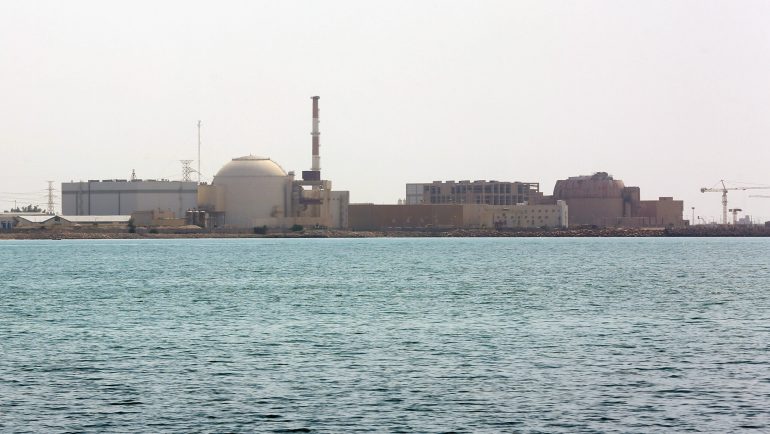Iran’s nuclear activities are being escalated as Israel fights Hamas in Gaza and Hezbollah challenges. Gulf states are slowly bridging their ties as regional tensions fall. Israel’s eight-month battle with Hamas in Gaza continues, the Hezbollah criminal organization and the Jewish army have battles on the Lebanon-Israel border threaten to elude further increase, Yemen’s Houthi rebels continue to harm ships and harm international trade in the Red Sea. Iran is responsible for much of this, as it continues to enrich uranium at near-waffen-grade rates while supporting and funding terrorist organizations throughout the area. The intelligence services of the country’s media reported on Thursday that intelligence agencies had been able to identify activities involving nuclear weapons that might take Israel’s arch-rival, the Islamic Republic, close to an atomic bomb than ever. Israel and Iran have waged a dark war against one another for centuries. In addition to attacks against big infrastructure in the Islamic Republic, it is thought that Israel’s military is responsible for hundreds of strikes against Iranian goals in the Middle East. Iran is thought to be responsible for attacks on Israeli-run oil ships, tries to kidnap and kill Israelis in recent years in nations like Cyprus and Turkey, and the persistent supply of weapons to its proxies. When Iran launched an extraordinary direct assault on Israel earlier this year in April, the dark war changed. Its decision to fire more than 300 weapons and suicide drones at the nation was a withdrawal from its strategy of directly attacking Israel through its numerous intermediaries situated on the Jewish state’s borders. The Iranian government launched an assault in retaliation for an Israeli attack on the Syrian embassy. After years of conflicts and complaints, it was the closest the two countries have ever been to a strong fight. Israel is not the only country in which Israel views Iran as the greatest threat to regional stability. Earlier this year, US Secretary of Defense Lloyd Austin hosted his Israeli rival, Yoav Gallant, in Washington. The US and Israel did” stand up against Iranian and Iranian-supported attacks against Israel and destabilizing actions throughout the Middle East,” according to a statement released by the Pentagon following their conference. The American attempts to de-escalate the condition have been successful, but the harsh markets between Hezbollah and Israel could lead to a second world war. Iran has long supported the terrorist organization, which is thought to be using its powers in the event of a strong conflict with Israel. Iran intended to apply Hezbollah in the event that Israel attacks its nuclear services. Israel does not want Hezbollah to continue fighting with Israel, but it wants to save it for more crucial issues, certainly Gaza. Dr. Menahem Merhavy, a study fellow and Iran-expert at the Harry S. Truman Institute for the Advancement of Peace at the Hebrew University of Jerusalem, claimed that Iran intended to apply Hezbollah to attack its nuclear facilities. Israel responded by firing at Israel a moment after Hamas launched a shock offensive against Israel, saying it was supporting the Arab terrorist organization in its struggle.” Iran does not want Hezbollah to now enter a larger conflict with Israel. Israel, which evacuated people from the borders with Lebanon, has been in a big trouble as a result. Many people have declared they will not go back to their homes if Hezbollah is n’t using its force to distance its soldiers from the area. Merhavy told The Media Line,” This has resulted in a very dangerous formula that will be challenging to collect from.” The conflict in Gaza and along Israel’s borders with Lebanon has mainly consumed the international community, with Israel, the US, and other users of the region currently having to decide who will strike first. Tehran has reportedly taken advantage of Tehran’s nuclear programme, which has drawn notice away from. Iran has begun installing new cascades of advanced centrifuges and plans to install others, according to a statement released by the International Atomic Agency ( IAEA ) earlier this month. ” During any other time, like a declaration would make a lot of noise”, Merhavy said. ” Iran can already be considered a threshold state, something that has been Israel’s nightmare for years “.Iran insists its nuclear program is intended for peaceful purposes, a claim Israel, the US, and others rule out. Many people worry that an Israeli or Iranian-led conflict will result in Egyptian presence. Israel’s target has likely been diverted from the Egyptian nuclear desires it has focused much of its work on in recent years due to its preoccupation with the Gaza Strip and its involvement in Lebanon. Israel’s recent disarray comes in addition to a year of domestic political turmoil brought on by a government’s effort to pass a controversial judicial reform, which sparked an unprecedented wave of protests in the nation. As more Israelis become frustrated with how the conflict in Gaza is being handled, demonstrations against the state have risen again in recent weeks. According to Merhavy,” Iran has about a feeling of euphoria that the idea that the Jewish state will progressively implode on itself may actually materialize.” ” This could force Iran to indulge in something more adventurous”.Iran’s companions in the Gulf, some of which have standardized relations with Israel, are likewise carefully monitoring improvements. They are eagerly on the outside. The nations that have diplomatic relations with Israel may be hesitant to support it, and they will do so very carefully to avoid offending everyone and avoid being seen as boldly cooperating with Israel. ” They are anxiously on the sidelines”, said Merhavy. The nations who have relationships with Israel are likely to be reluctant to support it, and they will do so very carefully to avoid offending someone and not appear to be cooperating with Israel. &# 13,
NEXT FROM&# 13,
Top Stories &# 13,
&# 13,
MORE FROM &# 13,
&# 13,
Major Stories &# 13:” It is important to remember that there was a method of convergence between Iran and the Gulf states even before the war,” said Ariel Admoni, a scholar and doctoral candidate from Israel’s Bar- Ilan University, citing the Chinese intervention between Saudi Arabia and Iran as an example. In the 2020 Abraham Accords, Israel normalized relations with the United Arab Emirates ( UAE), Bahrain, and Morocco.” The Iranians have extensive relations in the Gulf, and a lot of Iranian money is there. A shared concern about Iran as a growing threat to the region was one of the main factors that led to the agreement. Israel is now facing a bloody war against Hamas with a rise in Palestinian fatalities, which puts those Gulf states in a difficult position. These relations are being tested. Relations between Israel and Saudi Arabia are not at their best. As Hamas ‘ main supporter in the region, Qatar has a significant role in Hamas ‘ mediation efforts. Within the Gulf states, there have been tensions regarding Iranian behavior. The conflict in Gaza helped synchronize the messages between the Gulf states, with a particular emphasis on the Palestinians ‘ role as facilitators of humanitarian aid after a period of unrest. Things that used to cause disagreement in the past are no longer a source of conflict because there have been numerous meetings between them to coordinate the message. The war in Gaza helped synchronize the messaging between the Gulf states, with a focus on the Palestinians ‘ role as facilitators, according to Admoni. There have been numerous meetings between them to coordinate the message, and issues that have previously caused disagreements are no longer a source of conflict. The war in Gaza is not near conclusion, and these reports may be premature. Countries like Qatar emphasize that a Palestinian state must be established in order for a peace to be reached, Admoni told The Media Line. ” For fear of getting dragged into the “muddy” mess of Gaza, the Gulf states, including Qatar, will not rush to sign anything or make commitments.” The Saudis and Emiratis are much more reserved than Qatar, who will continue to be highly involved because of its relationship with Hamas.


















































